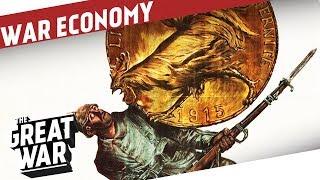
Allied War Economy During World War 1 I THE GREAT WAR Special
Комментарии:

Allied war economy=United States economy
Ответить
Kinda' proves what Gen. Smedley Butler said about War.
Ответить
This is a little of topic but how did the soldiers get the mud off their uniforms as sometimes they are covered in bud from a battle and after they look like it never happened? Did they just well clean them?
Ответить
Can we talk about this Indian weed?
Ответить
This channel is literally dead
Ответить
What was the most powerful Tank in WW1?
Ответить
Can't wait to see you guys in 2039... but if you start with the Japanese story first, it would be 2036
Ответить
Germany held out in the end a way. Germany, France, and Italys economies did collapse. Even Americas because of the war.
Ответить
That feeling when there is no new great war episode thursday...
Ответить
We are still waiting for the stupidest moves of the late war!
Ответить
So how different will be communist vs capitalist war economy
Ответить
You should do an episode about german flame troopers or Italian Arditi
Ответить
A major point that is often overlooked when talking about the macroeconomic scale of the war economies is not just the quantity of material produced, but also the quality of said material and its implementation, which was often appalling. For instance, popularly cited statistics state that of all of the shells fired at the Battle of the Somme in 1916 by British artillery, at least 50% failed to explode, often due to defective or poorly assembled fuses; British shells are still being dug out of Flanders' fields to this day on an almost daily basis. Likewise, although debated by armament historians in recent times, the French Chauchat light machinegun that was issued to American troops has long been notorious for its horrible manufacturing quality, with cited defects including the inability to interchange parts between guns due to poor build quality and cut-out magazines allowing dirt and grime to jam the firing mechanism.
This poor quality also extends to Entente mobilization as well; the demands placed on the British and French transport networks, particularly their railways, stretched each nations' available resources to breaking point with every available vehicle that could roll being pressed into service, sadly including those that were woefully inadequate for the task at hand. The hundreds of lives lost in the railway collision at Quintinshill, UK, 1915, and in the runaway train disaster at Saint-Michel-d-Maurienne, France, 1917, were both directly linked to the usage of badly obsolete railway rolling stock that prior to the war had been destined for the scrapyards, but had been pressed into emergency service with ultimately fatal results. Likewise, the use of passenger ships to carry war material led to many disasters, not least being the sinking of the Lusitania in 1915. And the pressganging of older merchant ships and overloading them with dangerous materials, combined with the otherwise excellent idea of the convoy system, can be directly linked as causes of the Halifax Explosion of 1917.

The fact that the entente was so straightened economically played a major role in between two wars societies and helps to explain the unpreparedness for the next war. People tend to mock France for her quick defeat, but instead should consider the effects of their extraordinary efforts in the Great war to achieve very little advantages. This turned people against politicians and their empty promises.
Ответить
Italian industry in the second world war is kind of impressive, too, and underestimated as well. I think that was the only German ally in Europe who supplied its army with its own effort, and fought war from Ethiopia through Lybia and Balkans to the Eastern Front.
Ответить
And here you got the reason why the USA really went into war. They feared not to get their money!
Ответить
LOL BONAR LAW
Ответить
Since Indy can't promote it on this channel I will, because I will want to see people moving over to it.
HE HAS BEGAN A SERIES ON WORLD WAR TWO CALLED 'WORLD WAR TWO' PLEASE SUBSCRIBE.

I'd love to see a special on the Lost Generation
Ответить
Interesting and educational video that examines the economics of warring countries, and what could lead to economic collapse rather than defeat by another country.
Ответить
Açcording to 2 time Medal of Honor winner and Marine Corp. Major General Smedley Butler, the real reason for US involvement in the war was to protect Wall Street's investment in France, Britain, and Italy. I do not think any of the families of the dead and wounded received any dividends from JP Morgan for their "investment", nor did they foot the bill of the war for the US tax payer.
Ответить
USA, the luckiest nation on Earth...
Ответить
me: The great war is a very serious subject
Indy: Bonar Law
me: pfffft hahahaha

Love your chanel, pls keep doing
Ответить
I wish I had the music list of your videos.
Ответить
Please subtitle...
Ответить
Indy carfully avoids connecting the creration of the Fed Bank with the outbreak of the Great War six months later. It's duration is the issue, with Britai n's gold reserves exhausled, then USA's entrance to "protect the debt". Just what the Fed had in mind--BANKERS WIN EVERY WAR
Ответить
You think Indy ever got laid in high school?
Ответить
I like this video as it exposes all the penalties and punishments imposed on people for following leaders. There is an old saying that people get the kind of government they deserve. So, by voting for the political leaders, the people got WW I and WW II and before that they got The American Civil War and the Indian Wars and the Spanish-American War and then later the Korean, Vietnam and Iraq wars and the debacle in Afghanistan and Somalia and
Ответить
If US economic aid in the forms of loans and leased manufacturing were keeping Britain and France in the war and able to fight, US intervention didn't hasten the ending of the war US intervention prolonged and worsened the war. If both the Central powers and Entente forces fought until their economies were collapsing then they would have forced each other into a treaty much sooner.
Part of the reason Germany refused to let any form of peace take place come 1916 was that the allied peace terms demanded Germany cede territory they were now totally economically dependant on, and the Entente refused to budge because they realised they could win a war of attrition through economy. No Entente economic advantages would force them to make concessions in peace negotiations or be destroyed. The USA's war profiteering killed tens of millions of people.

Easy we created the federal reserve 1913 lol and then nixon really stuck the fork in the US
Ответить
Allied War Economy=US War Economy
Ответить
I was surprised that a special about war economies wasn't produced sooner. But oh well. It's been done now. Great job.
Ответить
Will you be doing anything on Herbert Hoover; a special episode would be interesting to show that while as a President he failed to get out of the depression but as an engineer and organizer he helped feed Europe after not one but both World Wars
Ответить
Makes me wonder how much the triple entante owed the U.S. before the U.S. entered the war.
Ответить
Do I need to watch the video to know that war is what fueled the allied economy lol
Ответить
I play Supremacy, it's cool.
Ответить
How are you guys not involved with Paradox and Hearts of Iron lol
Ответить
"Food, Fodder, Copper, Oil...
Long ago these exports were shipped freely without fret ove the many seas of the world, but then one day, they were gone.
Now we're new recruits searching for any substitutes we may find, but I believe the seas shall open again one day. "

I don't understand, if J. P. Morgan died in 1913 how did he help Americans in WW1??
Ответить
My history teacher was a Mr L.E. Snellgrove (a rabid socialist and author of the book: "From Rocket to Railcar"). Mr Snellgrove once delivered a brilliant one-hour lecture on the disastrous effect of the Great War on Britain's economy - a blow from which Britain never recovered! Five years before he died, I remember that twit Anthony Wedgwood Benn expounding his own half-baked theories to Michael Moore during the documentary "Capitalism: A Love Story". Tony Benn loved asking the rhetorical question: "If you can have full employment in wartime then why not in peacetime?" Even if Tony Benn had watched this documentary I doubt if he would have changed his mind about anything. Benn lacked the critical thinking skills to listen to reason, he had blind faith in the soundness of his socialist ideology and ignored all evidence to the contrary.
Ответить
EU has just asked to switch to a war economy now!
Ответить
Allied Powers: The United States didn't contribute much.
Americans: Economy goes BRRRRRR...

Sorry for the late comment, but don't you mean J.P. Morgan Jr. ? He was even a victim of an assassination attempt in 1915. Thanks!
Ответить
I have been waiting for years to find such a channel.
Ответить
This is literally how the US started its rise to hedgemony
Ответить
Can you make a video on the Pittman Act?
Ответить
European belligerents had financed the conflict through loans, mainly from the United States, and as a result France owed the United States 4,137,224,354 dollars, about 80% of it directly to the U.S. Treasury and the rest to American banks.
The Quasi-War Between France and the United States

The economics of WWI is fascinating. Initially Britain financed the war, but by 1916 Treasury had run out of money, with most of it being lent to a France and Italy. Enter America, with its loans and then in 1917 the seizure of every German asset in the States which crippled the German economy. The French and Italians will never repay their loans and Britain will discount its debt to America. The crunch really came when the wheat crop failed in Canada, America and Argentina, it was Australia that came to the rescue but it didn’t receive payment for three years, not even for its wool clip.
However, after the war, no country, except Australia paid its debts; Hansard records that the Australians needed to be taught a lesson.
Then in 1953 from the London Agreement, the Germans agreed to recommence reparations. One of their conditions was that Australia not be paid anything, to which the other Versailles signatories and descendant countries heartily agreed.


























